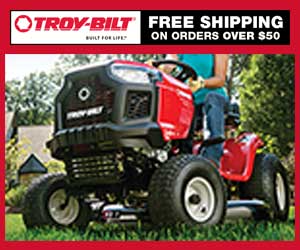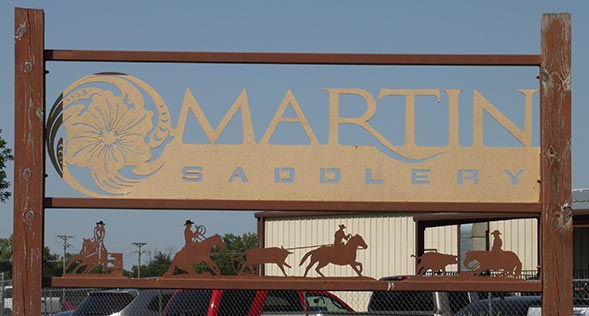
By Nick Pernokas
Nestled in the rolling hills of Central Texas, the Equibrand headquarters is an impressive site. The entryway features metal figures from many western disciplines and at the end of the long driveway, the building dominates the surrounding countryside on its knoll overlooking Granbury, Texas.
The lobby resembles something that might be in a home in Fort Worth, as does the conference room behind it. The equine magazines and saddles on display, however, remind you that you’re in the heart of Texas’s booming performance horse industry. Behind the lobby and conference room, you will find meek offices and all business.
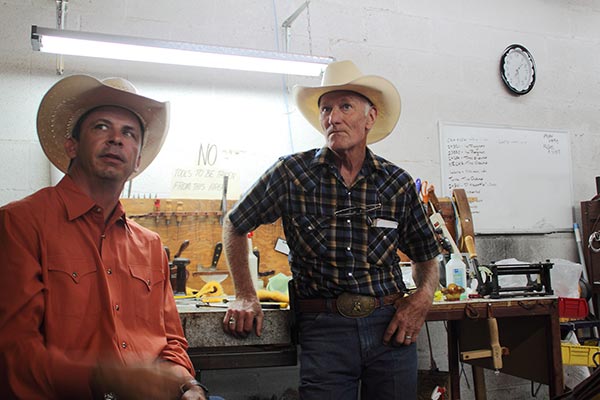
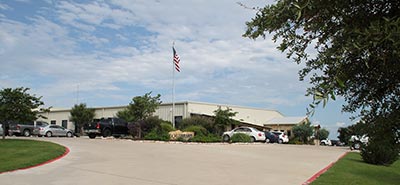
Brad Vance, vice president of sales, has worked for Equibrand for a total of 18 years. This includes a stint from 1996-1999 and then coming back to the company in 2002. Today Equibrand is the holding company for the popular brands Classic Rope, Rattler Ropes, Classic Equine, Martin Saddlery and the Cashel Company. Equibrand employs approximately 180 people across all brands, locations and manufacturing.
Classic Ropes was founded in 1986. By 1994, they were making some leg protection and saddle pads, thus formally establishing the brand Classic Equine in 1995. A few years later, the parent company Equibrand was formed. They acquired Rattler Ropes, followed by Martin Saddlery and the Cashel Company.
Equibrand prides itself on hiring talented people with horse or ranch backgrounds as employees. Another resource for Equibrand is the close proximity of Tarleton State University in Stephenville. Tarleton’s reputation in the rodeo industry provides a pool of young and smart horse people, who like to stay in the area to work after graduation.
“I think this business has grown because of the people we have here that are really passionate about horse sports; whether it’s team roping, reining, cutting, barrel racing or trail riding,” says Brad. “We want to produce a great product, and provide a lot of value to people who choose to use our products. Product development and testing is a main staple of what we do here and we all take great pride in the process.”
The 67,000-square-foot Granbury headquarters of Equibrand houses their distribution center, pad manufacturing, administration, sales, marketing and media production.
Walking the long corridors at Equibrand, you constantly meet employees who are active and enthusiastic participants in some facet of the horse industry. Brad himself was raised on a ranch in South Dakota. He competed in both cutting and roping events. After graduating from Tarleton, Brad stayed in Texas - this is a frequently repeated pattern. Equibrand CEO, Ken Bray, was a college student and roper, who went to work for Classic Ropes when it was in its infancy.
Classic Ropes
Rope production was in Granbury, until a disastrous fire at the rope facility in November 2015. Instead of rebuilding on the same property, Equibrand decided to build a new facility 30 miles away in Stephenville, Texas. Most of the employees working at the new plant also worked at the old one. The reason for this is that Equibrand employees in the rope production facility did not miss any paychecks during the rebuild. Good morale in employees pays off in good continuity.
As employee and roper Kyle Archino put it, “After the fire, not one employee lost their job or paycheck. They’re great people to work for. They continued to pay everyone through the rebuild, even when there wasn’t anywhere to work.”
Craig Bray, Ken’s brother, is the chief of operations for Equibrand and manager of the rope production plant and also started working in the rope shop right out of college. Craig knows everything there is to know about making a rope. Many of the employees are ropers as well, and they know how a good rope swings and works. The impressive facility covers about two acres and handles every step in production, from spinning raw materials into string to tying rawhide burners into the finished ropes.
“This new building will enable us to make the best ropes ever and allow us to be even more creative in the future,” says Craig.
Martin Saddlery
Martin Saddlery is located in Greenville, Texas and originally focused on the opportunity in the marketplace to produce saddles and strap goods for retailers. They consider Martin Saddlery to be a custom saddlery, and many of their customers are high-end saddle shops. Martin makes their own saddletrees, uses Hermann Oak Leather, real sheepskin and controls all levels of production. Countless custom options are available.
“They are truly custom saddles,” says Brad. “With the attention to materials, details, fit, look and function - it is a very custom product.” The suggested retail price begins at $2,800, but they’ve built a few for over $7,000. The turnaround time on a custom order is about three months.
Cashel trail and all-purpose saddles are also produced at the Martin shop. The suggested retail on the Cashel saddles begins at $1,800. With a 10 year guarantee on the fiberglass-covered, wood saddletree and an unconditional warranty on the workmanship and materials, there is a lot of value for the price in Martin custom saddles and Cashel trail saddles.
Martin Saddlery also builds a line of saddles for famed saddle maker, Donn Leson, called the Leson Classic. The Leson Classic line of reining saddles start in the neighborhood of $4,800.
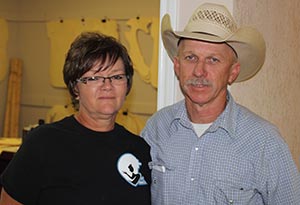
The general manager of Martin Saddlery is 51-year-old Brian Peterson. Brian is a master craftsman with an extensive background in precision welding and leatherwork. His wife, Tracey, also works at Martin and is a barrel racer, in addition to doing equine massage and therapy. “Tracey really understands the body parts and kinesiology of the horse,” says Brad.
Originally from Brisbane, Australia, Brian grew up around horses. He competed in the roughstock rodeo events and initially came to the States to attend Western Texas College in Snyder, Texas.
“I was involved with the leather deal since I was a kid,” says Brian. “If you wanted anything out there, you had to make it.”
By the time Brian was 13, he was buying hides and making headstalls to sell. He rode an Australian saddle, which was traditionally used for ranch work in Australia. American stock saddles with horns were pretty much relegated to the rodeo arena and there weren’t many good ones in circulation.
After some years in the States, he went back to Australia for four years. He worked for a top Australian saddle maker, Eddie Powell, learning to make saddletrees. Brian and his wife returned to Texas in 2003. Martin Saddlery bought all the equipment he needed and Brian set up a saddletree shop at the saddle facility. Eighteen months later, Brian took over as general manager. Brian continues to participate in equine events by showing in reined cow horse. He rides with Faron Hightower and Todd Crawford.
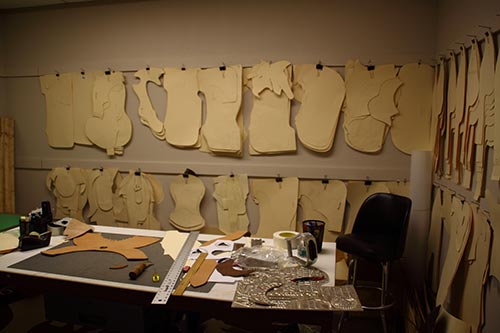
Martin’s saddletrees are made in-house. The wood is kiln-dried white pine from South Dakota, with fiberglass coating for strength and to ensure 100% seal from moisture. They strive to fit today’s stronger, stouter, athletic Quarter Horses.
“In 2003, we became the first factory to offer retail tack stores the ability to order a custom saddle,” says Brian. “We’ve gone from specializing in team roping saddles and making barrel saddles, to having a good quality, recognizable saddle in every discipline.”
Brian feels that the internet has become a driving factor in the rapid evolution of the saddle industry. Today’s saddle customers are more likely to research a saddle on the internet before they purchase one, as opposed to years ago when they would just show up at a tradeshow and buy one. In addition, the handicapping of events like roping, divisional barrel racing and the success of equine clinicians has made the horse industry accessible for much more information. These customers want saddles that will help them be more competitive in their chosen discipline.
“This industry is fed by trainers, so we try to get into each discipline on the trainer level,” says Brian. “We give them a saddle and let them pick it to pieces. We get answers that make us better. If it’s good for them, it should aid the non-pros.”
Martin Saddlery does have some influential riders who endorse their saddles. Todd Bergen, Sherry Cervi and Luke Brown are just a few of them. “We have no ego with our endorsements. We truly want them to give us direct feedback on what they like, and what they don’t like. We can then make it better based on what they need to compete,” says Brad.
In each of the equine disciplines, Martin has found that there are at least two or three riding styles. They try to produce a style of saddle to accommodate each of these. In the barrel racing saddles alone, there are five different styles of saddle. “One style is generally the person who sits up and down in the middle of a saddle,” says Brian. “The other is the person that sits more on their pockets with their feet out in front.”
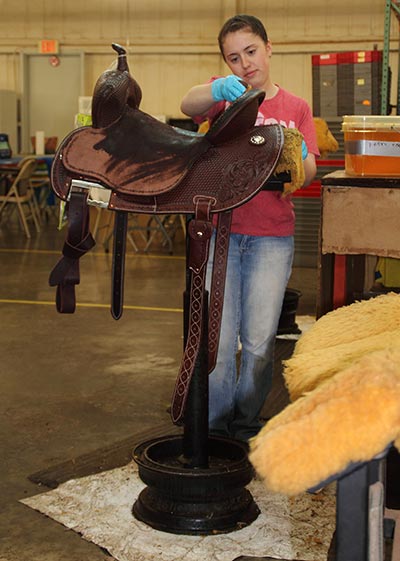
The 40,000-square-foot facility produces about 50 saddles a week. They also produce strap goods, leather horse boots and mohair cinches. These numbers are impressive - but the actual production is even more so. Production begins with saddle parts painstakingly cut out according to an order. The leather parts are all numbered to match the order and placed in a basket. The parts and the order stay together as they go through all stages of production. Eventually, the specific tree joins the parts as the saddle is crafted. Each worker fits parts precisely. Seamless swell covers are installed, padded seats are hand sewn neatly to seat jockeys and cantle bindings are fit perfectly into the seats. Ingenious jigs and templates ensure consistency.
“The assembly line lets you produce a saddle that is the same as the one in the store that the customer saw," says Brian. “When an individual builds a whole saddle themselves, they put their spin on it and you can’t reproduce that. A horn specialist can put on 50 identical horns. We’re a manufacturer of a product that people want to arrive just like it was in the catalogue.”
No matter which style or price point of saddle is being made, they all go down the same line, with the same workers doing the same steps. Brian emphasizes customer service as one of Martin Saddlery’s keys to success. A lot of this comes from simply listening to the customer. Martin also offers repairs on their saddles, as another way of providing customer service.
“When one person tells you something, it’s an opinion,” laughs Brian.” When five people tell you something, you start considering it as an option.”
Brian’s mentor, Eddie Powell, joined the Martin Saddlery team four years ago. Eddie is 63 and has been building saddles since he was 12. Prior to coming to the U.S. and working for Martin, Eddie Powell ran a government-accredited saddle making school in Australia, and provided many craftsmen with the knowledge to build American-style saddles. He also revolutionized the Australian saddle by being the first saddle maker to make a “Half Breed” Australian saddle, which was built on an American-style tree. These did not have a horn either. He built his own saddletrees and even built some English saddles. With Eddie’s contributions, Martin Saddlery will continue to evolve.
“We always wanted to provide a product that worked and provided a competitive advantage,” says Brad. “Every year we’re pushed to do more, because every competitive level increases for our customers.”
It looks like they’re succeeding. If you’d like to find out more about Martin Saddlery or the other Equibrand products, go to www.equibrand.com or https://martinsaddlery.com/ms/.
| Equibrand |
| 3500 W. Hwy 377 |
| Granbury , TX 76048 |
| (800) 654-7864 |
| www.equibrand.com |
| Martin Saddlery |
| 6120 Hwy 66 |
| Greenville, TX 75402 |
| (888)-308-2386 |
| www.martinsaddlery.com |
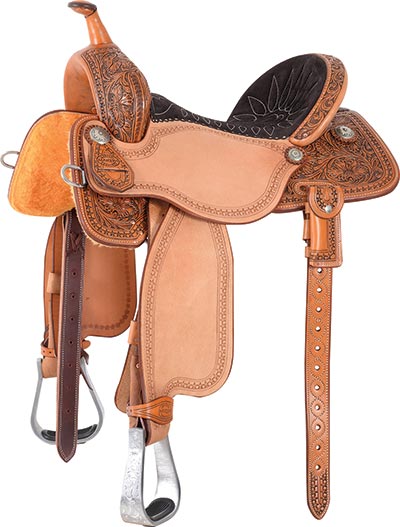
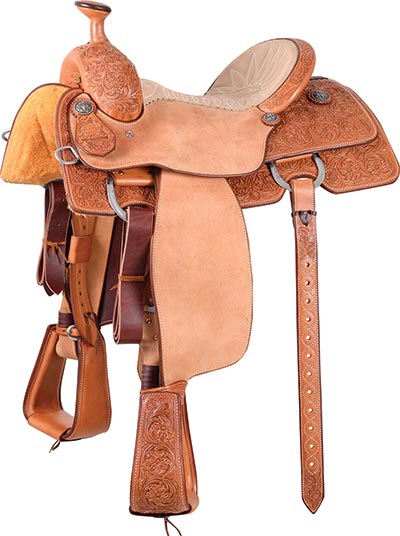
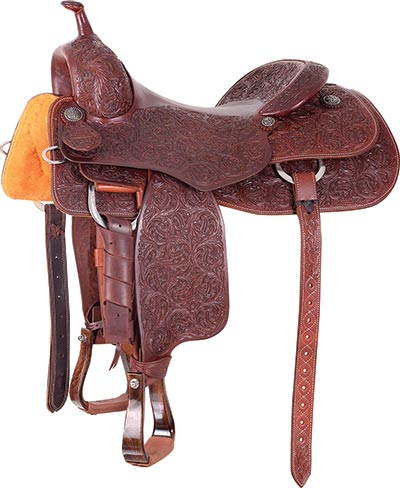
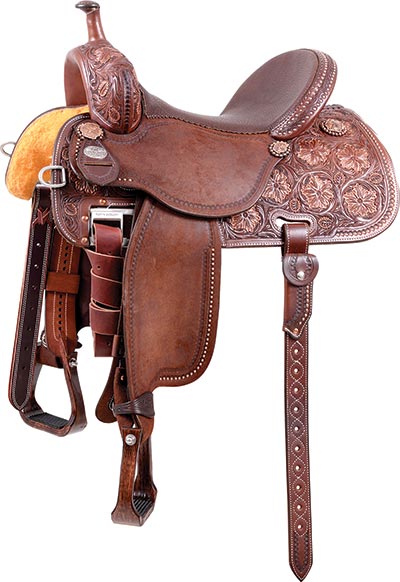
We want to gratefully acknowledge that this article is reprinted with permission from Shop Talk! Magazine
There are lots of good articles in our section on Tack & Farm. Find out about Saddle Fitters.






